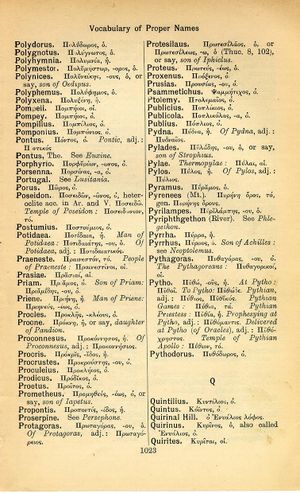Prusias: Difference between revisions
From LSJ
(6_13) |
(D_7) |
||
| Line 4: | Line 4: | ||
{{Lewis | {{Lewis | ||
|lshtext=<b>Prūsĭas</b>: ae, and Prūsĭa, ae, m., = Προυσίας,<br /><b>I</b> a [[king]] of [[Bithynia]], [[who]] [[hospitably]] [[received]] [[Hannibal]], [[but]] [[afterwards]] [[betrayed]] him to the Romans, Cic. Div. 2, 24, 52; Nep. Hann. 10, 1; Just. 32, 4, 2; Liv. 37, 25; Val. Max. 3, 7, 6 ext.—Form Prusia, Liv. 29, 12, 14.—Hence,<br /> <b>A</b> Prūsĭăcus, a, um, adj., of or belonging to [[Prusias]], Prusiacan: orae, i. e. his [[kingdom]], Sil. 13, 888.—<br /> <b>B</b> Prūsĭădes, ae, m., a [[male]] [[descendant]] of (an [[older]]) [[Prusias]], a Prusiade, applied to [[king]] [[Prusias]] [[himself]], Varr. ap. Non. 345, 23. | |lshtext=<b>Prūsĭas</b>: ae, and Prūsĭa, ae, m., = Προυσίας,<br /><b>I</b> a [[king]] of [[Bithynia]], [[who]] [[hospitably]] [[received]] [[Hannibal]], [[but]] [[afterwards]] [[betrayed]] him to the Romans, Cic. Div. 2, 24, 52; Nep. Hann. 10, 1; Just. 32, 4, 2; Liv. 37, 25; Val. Max. 3, 7, 6 ext.—Form Prusia, Liv. 29, 12, 14.—Hence,<br /> <b>A</b> Prūsĭăcus, a, um, adj., of or belonging to [[Prusias]], Prusiacan: orae, i. e. his [[kingdom]], Sil. 13, 888.—<br /> <b>B</b> Prūsĭădes, ae, m., a [[male]] [[descendant]] of (an [[older]]) [[Prusias]], a Prusiade, applied to [[king]] [[Prusias]] [[himself]], Varr. ap. Non. 345, 23. | ||
}} | |||
{{Gaffiot | |||
|gf=(1) <b>Prūsĭăs</b>, ădis, f., c. [[Prusa]] : Plin. Min. Ep. 10, 81, 6 || <b>-sĭēnsis</b>, e, habitant de [[Prusias]] : Plin. 7, 124.<br />(2) <b>Prūsĭăs</b>,¹⁴ æ, m. (Προυσίας), [[Prusias]] [roi de Bithynie, chez lequel [[Hannibal]] se réfugia et s’empoisonna] : Cic. Div. 2, 52 ; Nep. Hann. 10, 1 || <b>-ăcus</b>, a, um, de [[Prusias]] : Sil. 13, 888 || <b>-ădēs</b>, æ, m., descendant de [[Prusias]] : [[Varro]] Men. 407. | |||
}} | }} | ||
Revision as of 06:42, 14 August 2017
English > Greek (Woodhouse)
Προυσίας, -ου, ὁ.
Latin > English (Lewis & Short)
Prūsĭas: ae, and Prūsĭa, ae, m., = Προυσίας,
I a king of Bithynia, who hospitably received Hannibal, but afterwards betrayed him to the Romans, Cic. Div. 2, 24, 52; Nep. Hann. 10, 1; Just. 32, 4, 2; Liv. 37, 25; Val. Max. 3, 7, 6 ext.—Form Prusia, Liv. 29, 12, 14.—Hence,
A Prūsĭăcus, a, um, adj., of or belonging to Prusias, Prusiacan: orae, i. e. his kingdom, Sil. 13, 888.—
B Prūsĭădes, ae, m., a male descendant of (an older) Prusias, a Prusiade, applied to king Prusias himself, Varr. ap. Non. 345, 23.
Latin > French (Gaffiot 2016)
(1) Prūsĭăs, ădis, f., c. Prusa : Plin. Min. Ep. 10, 81, 6

